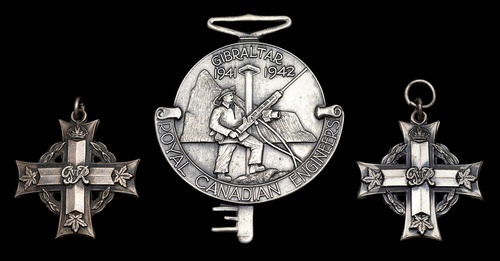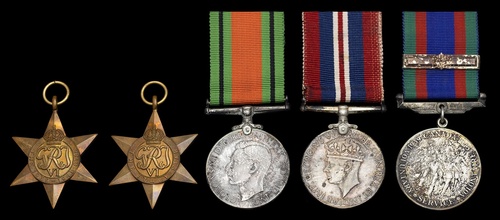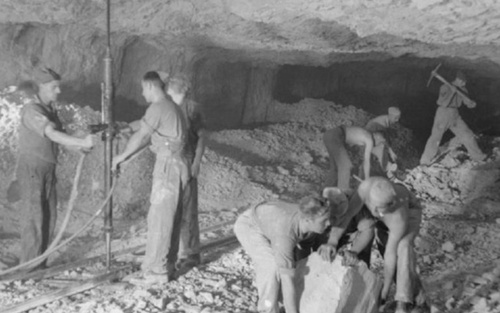Auction: 25001 - Orders, Decorations and Medals
Lot: 97
(x) A rare Second World War tunneller's 'Gibraltar Key' group of seven awarded to Major D. Taylor, Royal Canadian Engineers, who was subsequently killed in action in Italy in September 1944
1939-45 Star; Italy Star; Canadian Voluntary Service Medal 1939-45, with overseas clasp; Defence and War Medals 1939-45, silver, in their boxes of issue, together with Canadian Memorial Crosses, G.VI.R. (2), silver, both officially inscribed 'Major D. Taylor' and in their cases of issue, and Royal Canadian Engineers' Gibraltar Key award 1941-42, for use as a watch fob, the reverse officially engraved, 'Major D. Taylor', silver, by B. M. & Co., in its case of issue, extremely fine (8)
Around 325 Gibraltar Key awards were issued to Canadian Engineers for their drilling and tunnelling work on the Rock during the last war, few of which appear to have survived. Struck in silver by the Wartime Mining Association in Canada - and based on a design by Sapper R. J. Cunningham, No. 2 Tunnelling Company, R.C.E. - the first awards were presented by General A. G. L. McNaughton, a fellow Canadian, at a special ceremony held on 27 March 1943.
David Taylor was born in Surbiton, Surrey on 28 October 1911 but was working as a bank teller in Canada by the outbreak of hostilities. Enlisting in the Royal Canadian Engineers in Toronto in January 1940, direct from an appointment in the Militia, he was commissioned as a 2nd Lieutenant and embarked for the U.K.
The Rock
In November 1940, at the head of No. 1 Tunnelling Company, R.C.E. - a detachment of four officers and 99 men - Taylor arrived for duties in Gibraltar, the first Canadian troops to ever be stationed on the Rock. His sappers were to use their special skills in diamond drilling and hard-rock mining in close co-operation with the Royal Engineers, to develop and perfect the subterranean works required to bolster the Rock's defences. They arrived with 219 cases of equipment and were soon at work, the arrival of No. 2 Tunnelling Company in March 1941 adding to the valuable work undertaken by the Canadians.
That work is described at length in Major George F. G. Stanley's article Canadian Tunnellers at Gibraltar, which was published in the Canadian Geographical Journal in June 1944, and a copy of which is included. But by way of eye-opening statistics, it is said that excavation work in Gibraltar in the last war amounted to shifting 1,087,905 cubic yards of rock and rubble.
Italy
Taylor finally departed Gibraltar for the U.K. in early 1942, where he was posted to the Shetlands to carry out work on an old iron mine near Sollum. Having then been advanced to Major at the year's end, and taken command of No. 1 Tunnelling Company, he was embarked for Naples, Italy in January 1944.
The unit then moved to Bianchi to help construct an underground Command Centre, where it was re-titled No. 1 Drilling Company, R.C.E., followed by further construction work at Taranto, Cassino and elsewhere. Tragically, however, as related in the pages of The History of the Corps of Royal Canadian Engineers, Taylor met his end in the course of subsequent operations:
'On 1 September [1944] Major D. Taylor was killed while making too early a reconnaissance in Pesaro, on the Polish front. Company Sergeant-Major S. Dempster lost his life at the same time. Captain J. M. Thompson was driving their jeep; while he turned it around, Taylor and Dempster went to make a last check of the area before returning to camp and ran into an ambush. Thompson managed to avoid capture and escaped to take over command as Major. It had been understood that the town was clear of enemy and they had passed through the Polish troops on the outskirts without receiving any information to the contrary.'
Taylor, who left a widow, was buried in Ancona Military Cemetery; sold with copied research, including a statement of services that credits him with a mention in despatches.
Subject to 5% tax on Hammer Price in addition to 20% VAT on Buyer’s Premium.
Estimate
£800 to £1,200
Starting price
£600









